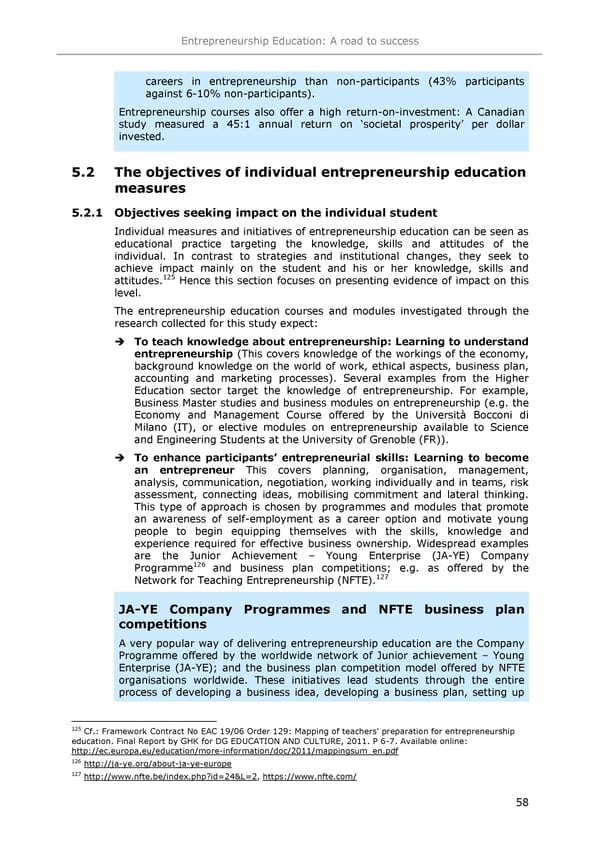Entrepreneurship Education: A road to success careers in entrepreneurship than non-participants (43% participants against 6-10% non-participants). Entrepreneurship courses also offer a high return-on-investment: A Canadian study measured a 45:1 annual return on 8societal prosperity9 per dollar invested. 5.2 The objectives of individual entrepreneurship education measures 5.2.1 Objectives seeking impact on the individual student Individual measures and initiatives of entrepreneurship education can be seen as educational practice targeting the knowledge, skills and attitudes of the individual. In contrast to strategies and institutional changes, they seek to achieve impact mainly on the student and his or her knowledge, skills and 125 attitudes. Hence this section focuses on presenting evidence of impact on this level. The entrepreneurship education courses and modules investigated through the research collected for this study expect: To teach knowledge about entrepreneurship: Learning to understand entrepreneurship (This covers knowledge of the workings of the economy, background knowledge on the world of work, ethical aspects, business plan, accounting and marketing processes). Several examples from the Higher Education sector target the knowledge of entrepreneurship. For example, Business Master studies and business modules on entrepreneurship (e.g. the Economy and Management Course offered by the Università Bocconi di Milano (IT), or elective modules on entrepreneurship available to Science and Engineering Students at the University of Grenoble (FR)). To enhance participants9 entrepreneurial skills: Learning to become an entrepreneur This covers planning, organisation, management, analysis, communication, negotiation, working individually and in teams, risk assessment, connecting ideas, mobilising commitment and lateral thinking. This type of approach is chosen by programmes and modules that promote an awareness of self-employment as a career option and motivate young people to begin equipping themselves with the skills, knowledge and experience required for effective business ownership. Widespread examples are the Junior Achievement 3 Young Enterprise (JA-YE) Company 126 Programme and business plan competitions; e.g. as offered by the Network for Teaching Entrepreneurship (NFTE).127 JA-YE Company Programmes and NFTE business plan competitions A very popular way of delivering entrepreneurship education are the Company Programme offered by the worldwide network of Junior achievement 3 Young Enterprise (JA-YE); and the business plan competition model offered by NFTE organisations worldwide. These initiatives lead students through the entire process of developing a business idea, developing a business plan, setting up 125 Cf.: Framework Contract No EAC 19/06 Order 129: Mapping of teachers' preparation for entrepreneurship education. Final Report by GHK for DG EDUCATION AND CULTURE, 2011. P 6-7. Available online: http://ec.europa.eu/education/more-information/doc/2011/mappingsum_en.pdf 126 http://ja-ye.org/about-ja-ye-europe 127 http://www.nfte.be/index.php?id=24&L=2, https://www.nfte.com/ 58
 Entrepreneurship Education Page 61 Page 63
Entrepreneurship Education Page 61 Page 63